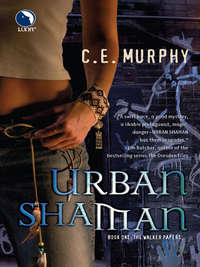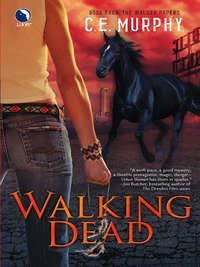
Полная версия
House of Cards
“Capricious,” Janx said with admiration. “Well done, for someone who protests she’s just been wakened.”
“I’m a lawyer. I’m supposed to be capable of conversing with an augmented vocabulary in order to obfuscate an argument without exerting myself. Besides, I was already awake. What do you want?”
“Better than a circus act,” Janx said happily. Then his bantering faded, a note of tension replacing it. “I require your services, Margrit. A balance has changed.”
Margrit coughed in disbelief. “You called me up at six-thirty in the morning to give me cryptic messages? ‘A balance has changed’? What the hell does that mean? A balance changed in January when you had Vanessa Gray killed, Janx. Alban told me that you’d breached protocol by doing that. You’re not supposed to go around murdering people’s assistants, especially when they’ve been assisting for over a century. It’s not playing fair, or something.”
“Margrit, my dear, I would never murder Eliseo Daisani’s assistant. That would be an inexcusable act of warfare.” Teasing lightened Janx’s voice again. Margrit groaned aloud and shook her head against the door.
“Right. You don’t kill anybody yourself, right? You just hire people to do it.” Janx had all but confessed to arranging Vanessa Gray’s assassination, and it had been through his cell phone records that Margrit had helped the police track down the hired killer. The man had never gone to trial. Instead, shortly after his arrest, he’d been found spread in grisly detail across the Rikers Island prison courtyard. Rumor said the inmates were told he’d been arrested for child molestation, and had meted out their own justice. Margrit had no intention of asking whether Daisani had taken matters into his own inhuman hands.
“Don’t be silly, Margrit. Of course I kill people.” Janx sounded downright cheerful, enough that she pulled the phone away to eye it. Uncomfortable as she was with the thought of the Old Races facing the human justice system, Janx’s bald-faced admission was beyond the pale.
“I am a lawyer, Janx. You shouldn’t go around telling me you kill people.”
“You’re not recording this conversation, are you?” Thin tension came back into Janx’s voice at the question, lifting hairs on Margrit’s arms. The dragonlord had rarely been anything but ruthlessly chipper in her experiences with him. She was certain she didn’t want to know what was making him cautious, and equally certain she would find out.
“I don’t usually record my home phone calls, but if you’re going to be calling up regularly to make blanket confessions, I might start. What’s going on?”
“We’ll discuss it this evening. I’ll send a car for you.”
“Just as long as Malik’s not driving.” The djinn, Janx’s second in command, had none of the dragonlord’s peculiar sense of honor. That Malik coveted power had been obvious in Margrit’s first meeting with him, but he was no match in personality or intellect for Janx. A nasty, cruel man, he exercised what power he had over those he considered inferior, and Margrit numbered among them. Janx might play with her, cat and mouse, more interested in the game than domination, but Malik would simply hurt her until she broke or died. She had stood her ground against dragons and vampires, but it was the djinn who frightened her.
Too late, she grimaced at the implied consent in her answer. “Don’t bother sending a car. I’ll get there myself.” Then impulse caught her and she asked, “Tonight?” with as much wide-eyed ingenuity as she could. “You don’t think my boss would be okay with me cutting out for a few hours to visit the notorious House of Cards and rub elbows with a gangster?”
“If I’d gotten to him first,” Janx said mildly, “I have no doubt it could have been arranged. The situation, I fear, is otherwise, and so I’ll see you this evening. Goodbye, Margrit.”
“If you’d—What? Dammit!” Margrit glowered at the silent phone, then got to her feet and stomped around the apartment as she finished getting ready for the day.
A Town Car idled on the street, its driver leaning on the hood so he could watch her building’s front door. As Margrit exited, he snapped to attention, calling, “Ms. Knight? I’m your transportation.”
Margrit looked both ways along the street, as if someone else might appear and answer to her name. “Are you talking to me?”
“Yes, ma’am.” He was a few years her elder, far too young to call her ma’am.
Margrit glanced up the street again, a terse smile forming. “I’m sorry. There must be a mistake. Excuse me.” She turned and managed a few steps before the driver moved in front of her.
“I’m supposed to give you this if there’s a problem, ma’am.” He offered a sleek cell phone, so small that his palm dwarfed it. “The number you want is programmed in.”
“The number I want,” Margrit echoed disbelievingly, and took the phone with dismay curdling her stomach. A glass of orange juice had seemed like a good idea minutes earlier. Now it felt like a bottle of acid had been poured into her belly and left to churn. She pressed the dial button and raised the phone to her ear, wincing preemptively.
“You have a problem, Miss Knight.” Eliseo Daisani sounded distressingly pleased to make such an announcement.
Margrit, prediction fulfilled, bit her tongue and waited until her impulse to respond with sarcasm faded. “Good morning, Mr. Daisani. Coming from you, that’s an alarming statement.” Coming from Eliseo Daisani, almost anything could be alarming. The appalling quickness with which he moved came back to Margrit as forcefully as the taste of his blood had the night before.
“Good morning,” he said, undeterred by her stiffness. “I think you’ll want to come to my office to discuss your problem, rather than stand there on the street.”
“It’s a quarter to eight, Mr. Daisani. I’m on my way to work.” It was an obligatory line of defense that allowed Daisani to chortle indulgently.
“Of course you are. I’ve already spoken with Mr. Lomax,” he assured her. Margrit bit her tongue again, this time on an exclamation of understanding. Daisani had gotten to her boss first, forcing Janx into the situation he called otherwise. “He can spare you for an hour or two,” Daisani went on. “Obviously, your ride is there, or we wouldn’t be having this conversation.”
Clichéd protests leapt to Margrit’s lips. “You can’t do this, Mr. Daisani,” was first and most obvious of them, though it was abundantly clear that he could, in fact, arrange her schedule to his liking. “I’ve asked you not to call me at work,” ran a close second, foiled by Margrit neither being at work yet nor having had the foresight to make that request. She said neither, clenching the phone and staring at the Town Car as people rushed by.
Getting in constituted Daisani winning a round. Margrit ran her thumb over the phone’s number pad with a half-formed thought of calling her boss and asking if the business mogul had indeed arranged for her to come in late. She had no doubt, though, that he had, and that Russell would tell her not to be absurd by refusing the vehicle Daisani had sent for her. She’d end up going regardless, and only arrive at Daisani’s stunning corporate headquarters breathless from walking. Margrit flipped the phone shut and let the driver open the car door for her.
Minutes later, the security guard at Daisani’s headquarters waved her in without asking for identification. Though it told her there was no chance she’d have turned Daisani down, not having to sign in made her feel better. She pushed the elevator button hard enough to hurt her finger, making a face at her own inconsistency.
Polished brass walls inside the lift reflected her sour-faced image back at her. Margrit drew herself up, shaking off the countenance of ill temper. There was no point in facing Daisani already on-edge and sulky. When the doors whisked open, she stepped out with at least a semblance of good nature in place.
On the surface, the front lobby of Daisani’s suites hadn’t changed since the last time she’d been there. It was opulent, with an enormous curved desk of pale wood dominating the room. No one sat behind the desk, and an embossed brown leather appointment book lay at a careful angle on its otherwise empty surface. The rest of the room was equally ostentatious, all the chairs antiques, many of them covered in rich red velvet that Margrit knew was as soft as it looked. Hardwood floors reflected inset lights from the ceiling, but not harshly; the whole room glowed with a warm, winning ambience.
Because she knew where to look for it, a slightly paler patch on the wood-paneled walls revealed where a portrait had once hung. Margrit walked around the desk and touched the spot gently, unexpected regret rising to clog her throat.
“Miss Knight.”
Margrit flinched, yanking her hand away and twisting it behind her back as she faced Eliseo Daisani. “Mr. Daisani. I didn’t hear you come in.”
The doors behind him, nearly twice the height of normal doors, were open just enough to let him step through. Their size emphasized his: Eliseo Daisani was not a big man, barely taller than Margrit herself. Framed by the doorway, he appeared almost delicate.
“You look well behind that desk, Miss Knight.”
Margrit managed a faint smile and stepped out from behind the desk. “You haven’t replaced Ms. Gray yet?”
“Ms. Gray was irreplaceable. I believe I’ve mentioned that.” His glance skittered to the pale spot on the wall and he inclined his head slightly. “Perhaps I’m sentimental. The photograph is in my office now.”
“I think even a vampire is allowed to be sentimental when somebody who was with him twelve decades dies, Mr. Daisani.”
“When someone has been murdered.” Daisani’s words were gentle, but his expression contorted, barely holding back rage before a fresh facade of good nature rose to replace the darker emotion. “You’ve become bold since the last time I saw you. You wouldn’t have thrown that word around so lightly, before.”
“I’m feeling reckless,” Margrit admitted. “What do you want from me, Mr. Daisani?”
He came forward, offering both his hands to her, a gesture that could be equally welcoming or condescending. She put one out in return and he clasped it, his touch disconcertingly hot as he all but bowed over her fingers. “The first time we met I offered you a job. I’d like to say that offer still stands, but circumstances have changed.”
“Mr. Daisani.” Margrit withdrew her fingers from his grasp as politely as she could. “I told you. I’m happy with my job. I’m not interested in coming to work for your law branch.”
“No.” The word was clipped, Daisani’s pleasant front slipping again to reveal anger. “As I said, the circumstances have changed. I find myself in a unique situation, and, to your dismay, you’re the person best suited to helping me with it.”
Caution chilled Margrit’s hands and she forced herself not to take a step back, though Daisani’s phrasing brought an unwilling smile to her face. “To my dismay. You’re probably right about that. Mr. Daisani, I don’t owe you anything. I did what you asked in helping to find Vanessa’s murderer. We’re even.”
“I require a personal assistant.” Daisani went on as if she hadn’t spoken. “Thus far, a suitable candidate has not yet accepted the position.” His eyebrows quirked upward and he confessed, “Nor applied. Miss Knight—Margrit, if I may—you’ve proven yourself to be delightfully discreet and levelheaded regarding extraordinary matters.”
Margrit wished abruptly that she had remained on the far side of Vanessa’s desk, so she might use it as a prop and lean on it for emphasis. On the other hand, remaining there, where Daisani wanted her to be, would only enforce his argument. “You mean in the face of learning about the Old Races, and finding out that half the power in this city isn’t even human?”
Daisani waggled a finger. “Don’t be absurd, Miss Knight. There are only one or two of us who aren’t human.”
“It’s enough. Mr. Daisani.” Margrit made his name into hard sounds, stopping him when he would have gone on. “Mr. Daisani,” she repeated more quietly. “I owe a dragonlord two favors, and the gargoyle who got me into this mess won’t talk to me.” Surprise flickered across Daisani’s face and Margrit cursed herself for letting go a piece of information he’d lacked. “I’m not foolish enough to think the Old Races are done with me. Alban thought he could get you and Janx off my back—”
Another hint of surprised interest crossed Daisani’s face, and Margrit broke off, setting her front teeth together and pulling her lips back in sheer frustration. Laughter suddenly danced in Daisani’s eyes and he clucked his tongue. “Humans are the only species on this planet who have forgotten that baring teeth is a sign of aggression.” He stepped forward, raising a hand so quickly she barely saw the movement, only became aware that he’d brushed her jaw when she felt the resulting warmth. Conflicting impulses froze her in place, outrage that he should feel free to touch her, coupled with white fear at how fast he’d moved. “Let me remind you of what I am, Miss Knight. Let me warn you that one of my kind might see such a raw expression as an invitation to courtship.”
Her fear dissolved, washed away by a sense of the absurd. Margrit lifted a hand slowly, and put it against the inside of Daisani’s wrist. His pulse was desperately fast beneath her fingertips, the beat of a small frightened mammal, not an adult human. But then, he wasn’t human. She pushed his hand away with gentle determination, her jaw set. “One of your kind knows better than that how to read human expressions, Mr. Daisani. Don’t touch me again.”
Astonishment splashed over Daisani’s face, brightening it until his smile was wide and genuine, showing flat, human teeth that seemed at odds with every story Margrit had ever read about vampires. “Bravo! Bravo, Miss Knight! Without a hint of fear! Bravo! How do you do it?”
“That would be telling.” The moment of conflict was gone, and Margrit’s heart started to accelerate, her body reacting too late to the stance her intellect had taken. She could answer his question—had answered it, when a green-eyed dragon had put it to her, but Janx had taken it as part of a favor owed. Margrit wasn’t going to make that bargain again.
“Mr. Daisani, I don’t want to work for you. Right now I don’t owe you anything, and you’re not going to talk me or coerce me into quitting my job. If that’s all you had to discuss with me, I think you’re wrong. I don’t have a problem. You do. It’s been very nice to see you again, sir. Good day.” She inclined her head and turned toward the elevator.
“Miss Knight.”
Margrit stopped with her hand over the button, waiting.
“Alban Korund has made no effort at all to get me off your back, as you so eloquently put it. You may wish to reconsider where you place your faith, young lady. Unlikely as it may seem, there are worse choices than Eliseo Daisani.”
She nodded noncommittally, pressing the elevator call button. A moment later the door chimed and opened and she stepped in, not yet willing to draw a breath of relief.
A breeze stirred the elevator’s still air, and Daisani stood beside her, smiling. “By the way, Margrit, do give your mother my regards. A remarkable woman. Remarkable, indeed.”
Then he was gone and the door closed, leaving Margrit to stare, wide-eyed and silent, at her reflection in the polished brass.
THREE
MORE THAN ONE speculating glance followed her when she arrived at the Legal Aid offices. Whispered conversations broke off until she’d passed, leaving little doubt that Daisani’s arrangement with Russell Lomax had slipped out. Knowing any response would be protesting too much, Margrit nodded greetings and made her way to her desk. She had a trial to prepare for, defense for a rapist who claimed his innocence with sneering mockery. Evidence, to her private relief, was on the prosecution’s side, but her job was to defend, not judge.
She flipped the case file open, skimming through material she’d long since memorized in search of any errors she might’ve made that could lead to appeal. There were none; she knew it as well as she knew her own reflection. It was habit, the ritual she went through the day before a trial.
“Ms. Knight?”
“Grit.” Margrit looked up to find a youthful receptionist leaning over the edge of her cubicle. “You can call me Grit. Or Margrit,” she added, at the look of bewilderment on the young man’s face. “If Grit’s too weird. What’s your name?”
“Sam.” He stepped around the cubicle, an envelope in one hand and the other extended for Margrit to shake. “I never heard Grit as a nickname for Margrit. You really know Eliseo Daisani?”
Margrit sighed and closed her case file as they shook hands. “We’ve met several times, yes.”
“What’s he like?”
“Short, and accustomed to getting his own way.”
Sam grinned. “You don’t think much of him, huh?”
“I’d never be impolitic enough to say that.”
“There’s a betting pool on how long it’ll take you to go to work for him.”
Margrit laughed. “Really? What’s the buy-in?”
“Ten bucks. A couple people’ve got you pegged for handing in your resignation as soon as the Newcomb trial is over.”
Margrit reached for her purse. “Come on, I’m made of sterner stuff than that. I give me at least four months. Just don’t tell anybody else I’m betting on me.”
“Four months?” Sam looked dismayed. “And I’d already signed in for five.” He took the ten she handed him anyway, stuffing the cash in his pocket. “Oh! This is yours. A courier brought it by before you came in.” He offered the envelope, marked with an NYPD stamp across the seal. “They say you’re going places. That you’ve got a lot of friends in the police department, and that the mayor knows your name, too.”
“‘They’? What am I, notorious?” Her cell phone rang and she dug it out of her purse, lifting her chin to dismiss Sam, though she added, “Four months. Don’t forget,” as he waved and disappeared down the corridor. Margrit smiled, tilting her phone up to check the incoming call.
A knot of tension she didn’t know she’d been carrying came undone at the name on the screen and she answered with a smile. “Tony. Thank God. Somebody I want to talk to.” Wanting to talk to the police detective was a good sign, though a flash of guilt sizzled through her. Tony Pulcella represented the ordinary world, separate from the one she’d been immersed in since Alban’s reappearance the night before. For a moment she wasn’t certain if it was Tony she was glad to hear from, or if it was simply a reminder of reality that was calming.
“It’s only twenty after nine, Grit. It’s that bad already?”
“You wouldn’t believe me if I told you.” She slid down in her chair, head against the padded rest. “It’s good to hear your voice, but aren’t you supposed to be out catching bad guys? Is something wrong? Are we off for dinner tonight?”
“I’m sorry,” he replied, answer enough. Margrit’s smile fell away. She had no name for what their relationship had become over the last months: more than friends, but no longer lovers, with a weighty question mark hanging over whether they would be again. Innumerable things had changed the shape of their romance, most of all the pale-haired gargoyle who’d haunted Margrit’s dreams the night before.
Alban’s image lingered in her mind as she brought her attention back to the phone call. “I’m sorry. What did you just say? I wasn’t listening.”
An edge of concern came into Tony’s voice. “You okay, Grit?”
“I’m fine.” She straightened in her seat, deliberately shaking off the gloom that had settled over her. “Say that again. Something about a party?”
“Yeah. You ever heard of Kaimana Kaaiai?”
“Nope. Should I have?”
She could almost hear Tony shake his head. “Me either. He’s some philanthropist out of Hawaii, one of those kinds of guys who rents his mansions to homeless people for almost nothing, because he can’t live in all seven of them at once, anyway.”
Margrit’s eyebrows shot up. “I’d be willing to try being homeless in Hawaii … .”
“You and me both. Anyway, apparently he’s got this thing about early-twentieth-century architecture, and he’s in town for a week to do some glad-handing and donate some funding for that speakeasy down in the sewers.”
“The subways, not the sewers,” Margrit said pedantically. “Cam never would’ve gone with me to look at it if it’d been in the sewers. Besides, sewage probably would have ruined those amazing stained-glass windows.” They were more astonishing than anybody knew. Although abstract at first glance, if the three windows were layered over one another, they showed representations of the five remaining Old Races in glorious, rich color.
“Right. Well, I guess the city needs money to put in a seriously high-class security system down there, and they’ve been negotiating with this Kaaiai guy over it.”
“Okay. What’s that got to do with dinner tonight?”
“The guy’s got a security detail, but one of the things he does is always get a few locals to work on it. He feels like he gets a better sense of the city that way, and besides, locals recognize the real trouble.”
“And he wants you?” Margrit laughed at the incredulity in her own voice. “I’m sorry. I didn’t mean to sound so surprised. I’m sure you can do it. It’s just—”
“Just that I’m a homicide cop without any high-reaching connections,” Tony finished. “Six brothers and sisters and none of them are in anything like this league for casual socializing. I have no idea how he came across my name.”
“Have you asked?”
“I haven’t met him yet. He comes in this afternoon.”
“Aha. So we’re off for tonight. Well, damn.”
“I can make it up to you.”
Margrit tilted back in her chair, an eyebrow arched. “How?”
“The lieutenant says she’s heard Kaaiai is generous to the people who work for him, and I guess he is. He’s issued a package of invitations for the events he’ll be attending while he’s in the city. Theater, dinners, lunches, concerts—the guy’s booked. Looks boring as hell to me, but the point is I can bring a date.” Wryness crept into his voice. “Anybody who passes the security clearance and doesn’t mind her date working all night and not paying attention to her.”
Margrit laughed. “You know anybody like that, Detective?”
“I had a girl in mind,” he said good-naturedly. “She works for Legal Aid, but I think this is probably her kind of thing. She’s gotten kind of high-profile lately.”
“Really?” Margrit’s laughter left a broad smile stretched across her face. “What’s she done?”
“Got the governor to pass clemency on a murd—”
“Self-defense.”
Tony hitched a moment before agreeing. “Self-defense case.”
Margrit leaned forward in her chair again to put an elbow against her desk and press her fingers into the inner corners of her eyes. Long before the Old Races had interfered in her life, her job had been the major crack in her relationship with Tony. Coming, as they did, from different angles on the same side of a flawed legal system, the topic incited them to breakups as often as passion got them back together.
The case she had on the table was the sort they could never discuss. The very necessity of building a decent defense for a rapist was offensive to the cop in Tony. Margrit sympathized, even wondered sometimes if he was right, but her ability to abhor the crime and still do her job effectively was a dichotomy Tony could barely fathom. Arguing that anything less than her best would create an opportunity for appeal or mistrial fell on deaf ears.
Curiosity tickled her, making her wonder if Alban would have the same difficulties. The world he came from might be so different from Margrit’s own that no evident double standard in human behavior could distress him. Margrit curled her lip, trying to push the thought away as she listened to Tony’s amused litany.
“Then she took on the richest guy on the East Coast over a squatters’ building, and he backed down. I think she’s got some high-minded ambitions. Hanging out with this kind of crowd might be good for her career.”








